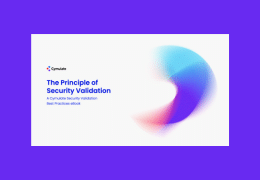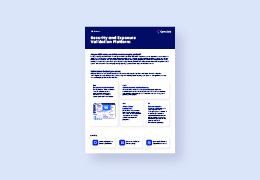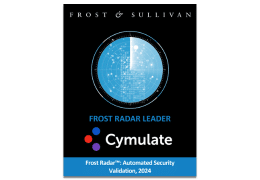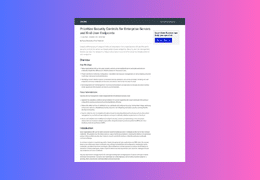Cymulate and AttackIQ Comparison Chart
| Critical Capability | Cymulate | AttackIQ | ||
| End-to-End Risk Management | Measure and monitor organizational risk from attack surface analysis to pre-exploitation, exploitation, and post-exploitation, all stages of the attack kill chain. | Post-exploitation only. Missing critical details like Reconnaissance, Poor Email and Web, No WAF (Web Application Firewall), Poor to No Lateral Movement, Poor Data Exfil. | ||
| Investment in Open Cyber community & Education | Cymulate is launching a comprehensive cybersecurity academy July 1st. | AttackIQ offers free AttackIQ academy courses | ||
| Useable by All Cyber-Maturity Levels | BAS (Breach and Attack Simulations) and Automated Red Teaming require zero coding or advanced cybersecurity training. Advanced Purple Teaming Framework requires adversarial skills. | Requires adversarial skills and prior knowledge of coding, cybersecurity techniques & tactics. Requires an FTE to operate. | ||
| Immediate Threats Intelligence | Testing against a continuous feed of the latest threats updated. From pre-exploitation, exploitation, and post-exploitation. Across the entire kill-chain. | Testing against continuous feed of latest threats. Only tests endpoint. | ||
| Time to Value | Deploy within an hour, full value on the first day. Assess risk post-M&A in a day! One agent per environment. | Weeks. Agents – often recommend up to 10% of workloads. | ||
| Automated Red Teaming | Autonomous attack campaigns implemented with real-world penetration and propagation techniques. | No pre-exploitation, phishing, or attack surface penetration. Lateral movement is limited to a single network connection to a predesignated host. |
When evaluating AttackIQ vs Cymulate, it’s essential to be thorough, fair, and clear. Using this mindset, let’s examine how Cymulate compares to AttackIQ across six key critical capabilities.
1. End-to-End Risk Management
Adopting continuous security validation to optimize security controls, incident response plans, and cybersecurity investments means finding a solution that covers the entire enterprise landscape across all levels of the attack kill chain.
- Cymulate’s attack simulations work from reconnaissance to post-exploitation, spanning premises, clouds, bare metal, and containers. It includes reconnaissance, testing of email and web application firewalls, and a phishing module for risk assessment and employee education. Unlike some competitors, Cymulate is designed to test production environments, ensuring comprehensive risk management.
- AttackIQ, while also designed for production environments, is limited to post-exploitation testing on endpoints. It lacks reconnaissance and web application firewall testing capabilities, reducing its effectiveness in end-to-end attack kill chain coverage.
2. Investment in Open Cyber Community & Education
With the ongoing shortage of skilled cybersecurity professionals, community support and educational resources are more essential than ever. Both Cymulate and AttackIQ have invested in addressing this need.
- AttackIQ offers a range of free, vendor-neutral courses through its AttackIQ Academy, covering skills from cybersecurity management to MITRE tactics.
- Cymulate also launched its cybersecurity academy, providing vendor-neutral courses that include practical labs and ISC CPE credits to help professionals advance their skills.
Both platforms deserve recognition for their contributions to industry education.
3. Usability for All Cyber-Maturity Levels
Given the shortage of skilled cybersecurity staff, usability is critical. Solutions should be accessible to all cyber-maturity levels, from beginner to expert.
- Cymulate’s Breach & Attack Simulation (BAS) and Continuous Automated Red Teaming (CART) provide a user-friendly interface requiring no coding or advanced training. In-depth reports cross-reference the MITRE ATT&CK framework, delivering prescriptive technical remediations and executive-level reporting. Advanced users can leverage Cymulate’s Advanced Purple Teaming Framework for automating sophisticated scenarios.
- AttackIQ, however, requires a full-time expert with advanced adversarial skills and coding knowledge.
4. Immediate Threat Intelligence
Given the constant evolution of attacker tactics, techniques, and procedures, continuous updates in security validation are essential.
- Cymulate provides a 24/7 feed of the latest threats, covering every step in the attack kill chain from pre-exploitation to post-exploitation.
- AttackIQ also provides a continuous threat feed, though its updates are limited to endpoint testing.
5. Time to Value
While the benefits of continuous security validation are strategic, adoption should be low-touch and resource-efficient.
- Cymulate’s SaaS platform deploys easily with a single lightweight agent, allowing testing to begin within the first hour.
- In contrast, AttackIQ requires setting up a manager and deploying thousands of agents, along with significant training, leading to a longer implementation time.
6. Automated Red Teaming
Automated Red Teaming expands security testing on a broader scale.
- Cymulate’s CART enables autonomous attack campaigns across the entire kill chain from pre-exploit to post-exploit.
- AttackIQ, limited to post-exploitation, lacks pre-exploit, phishing, and web application firewall capabilities, constraining its red-teaming scope.
Why Cymulate Leads in Security Validation
When it comes to AttackIQ vs Cymulate, Cymulate stands out as a comprehensive platform for Continuous Security Validation, Purple Teaming, and Automated Red Teaming. It requires no advanced training, offers full attack kill chain coverage, and provides immediate value with minimal setup. In contrast, AttackIQ has a high learning curve, requires coding skills, and is limited to post-exploitation testing.
Ready to see the advantages of Cymulate in action? Book a demo today to experience how Cymulate’s comprehensive security validation platform can elevate your organization’s resilience.










